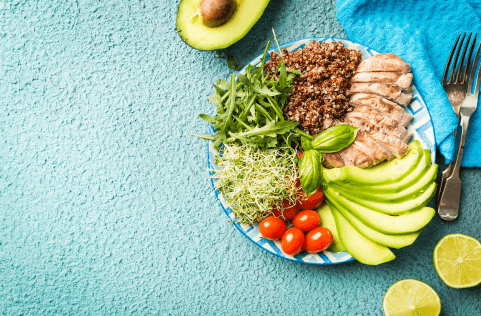When’s the last time you asked yourself, “what do you feel like eating? or “what food(s) sound good to you?” To be satisfying, a meal should include foods that you genuinely enjoy and that “hit the spot.” And for many of our clients, feeling a sense of satisfaction in a meal decreases their yearning for foods at a later time. Discovering satisfaction in your eating is what’s going to prevent you from feeling deprived, and in turn, to help to decrease any obsessive thinking about food.
Maybe it's been a while since you let yourself eat the foods that you truly enjoy. If this is the case, you may need to experiment with different flavors, textures, and temperatures to help guide you. Exploring these sensual qualities of food when you eat can help you discover what foods you like, and in turn, to increase the satisfaction in your eating.
As you explore the sensual aspects of food, make note of how satisfied or unsatisfied you feel after eating different types, and start to become aware of which foods you enjoy. And remember: not all foods will be desirable to you, and that’s ok! Everyone has a different experience with taste and texture sensations.

how to build a satisfying meal or snack
Take a few moments to decide what you want at that moment. If you have trouble deciding what to eat, consider asking yourself the following questions:
- What do I feel like eating?
- Do I want something sweet, salty, sour, or even slightly bitter?
- Do I want something crunchy, smooth, creamy, soft, lumpy, fluid, etc.?
- Do I want something hot, cold, or moderate?
- How will my stomach feel when I’m finished eating?
Once you have an idea of the foods that sound satisfying to you - let’s build that plate!
- Carbohydrates: Ensuring you have some type of carbohydrate present at your meals since they are our brain (and body’s) #1 love. Carbs help you feel satisfied and fueled for your day!
- Protein: Protein is the major building block of all cells. It is found in muscles, tendons, and connective tissue throughout the body. Incorporating protein in meals can help you feel satisfied without a dreaded energy crash.
- Fat: Including fat in your diet is essential to support cell growth, internal protection and insulation as well as for the absorption of certain hormones. Having fat sources at mealtimes can also help increase your satisfaction at mealtimes and takes a longer time to digest.
- Produce: This is an optional addition to a meal that can add in an extra nutrient boost in addition to more flavor and texture. Try choosing different colored fruits and vegetables throughout your days/weeks to increase the variety in your meals.
- Fun foods: This is another optional add on (but, honestly, we encourage it). These are any foods that are fun for you, (think: chips, fries, candy) that help round out a meal and help you hit the satisfaction sweet spot!

examples of a satisfying plate
Some examples of balanced food combos include:
- Toast with avocado and egg (add sliced tomato with a bit of salt and pepper)
- Apple slices and peanut butter
- Vegetable and fruit slices with hummus and cheese
- Tuna salad or chicken salad with crackers and grapes
- Yogurt with berries and nuts
- Cheese, crackers, and sliced apples
- Smoothie with yogurt, frozen fruit, and nut butter (or chia seeds)
- Goldfish crackers mixed into trail mix
- Fresh berries and dark chocolate with almonds
how do I know how much is satisfying?
Determining how much of each food is up to you! This is when you can start to tune into your hunger and fullness levels and understand how much food would be satisfying for you. Don’t worry - this isn’t an exact science and you will likely have different hunger levels and cues with the varying days. This is normal! Allow yourself to honor your hunger - as you will likely have more satisfaction from foods when you understand your hunger cues.
Treating your eating experiences as mini-experiments can be helpful in understanding the right amounts to have to fuel yourself. Maybe you notice you were hungry very soon after your last meal - try asking yourself:
What was included in my last meal? Was there anything missing? What could I add in next time that may be a little more satisfying? Can I try to include that type of food now to help honor my hunger?

how can nourishrx support you
Remember, your journey to becoming a more intuitive eater is your own. Be gentle with yourself!
Knowing what you like to eat, and believing that you have the right to enjoy food, are key factors in a lifetime of intuitive eating. Satisfaction is derived when you take the time to figure out what you want to eat, give yourself unconditional permission to eat, and then eat in a relaxing, enjoyable environment. If it takes you some time to accomplish all of this, be patient - YOU are worth it.
If you're feeling stuck finding the satisfaction factor with food, drop us a line to see how we can best support you.
Comments Off on How to Build a Satisfying Plate